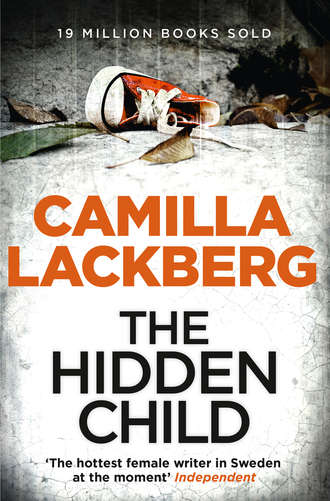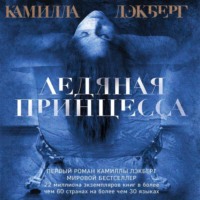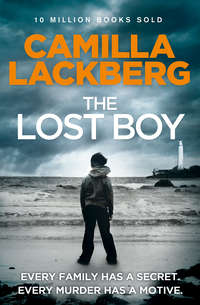
Полная версия
The Hidden Child
‘Axel received threats?’ asked Mellberg, spraying more crumbs across the table.
‘Quite a few, from what he said,’ said Martin. ‘They’re all on file with the organization that he works for.’
‘Had he received any from Sweden’s Friends?’
Paula shook her head. ‘He couldn’t tell us whether he had or not. And I can understand that. He must get so much of that junk in the post, why would he pay any attention to it?’
‘What was your impression of him? I’ve heard that he was something of a hero in his youth.’ Annika gave Martin and Paula an inquisitive look.
‘Stylish, distinguished …’ said Paula, ‘but very subdued, which is only natural in the circumstances. He definitely seemed upset by his brother’s death. Did you have the same impression?’ She turned to Martin, who nodded.
‘Yes, I thought so too.’
‘I assume that you’re going to question him again,’ said Mellberg, looking at Martin. ‘And I understand you’ve been in touch with Pedersen, is that right?’ He cleared his throat. ‘A bit odd that he didn’t want to talk to me.’
Martin coughed. ‘I think you must have been out walking the dog when he called. I’m sure you were at the top of his list.’
‘Hmm, well, you’re probably right. Okay, go on. What did he say?’
Martin summarized Pedersen’s findings. Then he told them: ‘Apparently Pedersen rang Patrik first. Sounds as though he isn’t entirely happy about being a stay-at-home father: he got Pedersen to give him a full report. Considering how easy it was to entice him over to the crime scene, I bet we’ll be seeing him and Maja here at the station very soon.’
Annika laughed. ‘Yes, I talked to him yesterday. He was trying to be diplomatic, saying that it would probably take him some time to get adjusted.’
‘I believe it,’ snorted Mellberg. ‘What a stupid idea: grown men changing nappies and making baby food! My generation didn’t have to put up with that sort of rubbish. We could devote ourselves to things we were better suited for, while the women took care of the kids.’
‘I would have gladly changed nappies,’ said Gösta quietly, looking down at the table.
Martin and Annika glanced at him; they’d only recently found out that Gösta and his late wife had had a son who died shortly after birth. There had been no other children. Everyone sat in silence for a moment and avoided looking at Gösta. Then Annika said:
‘Well, I happen to think it’s a good thing. You men get to find out how much work is involved. I don’t have any of my own’ – now it was Annika’s turn to look sad – ‘but all my women friends have children, and it’s not like they lie around eating bonbons all day long because they’re at home with the kids. So this will probably be good for Patrik.’
‘You’ll never convince me of that,’ said Mellberg. Then he frowned impatiently and peered down at the papers lying on the table in front of him. Brushing off all the crumbs, he read a few sentences before he spoke again.
‘Okay, here’s the report from Torbjörn and his boys …’
‘And girls,’ added Annika. Mellberg sighed loudly.
‘And girls. You’re certainly on some sort of feminist warpath today! Shall we get on with this investigation, or should we just sing “Kumbaya” and debate the feminist agenda?’ He shook his head before proceeding:
‘As I said, I have here the report from Torbjörn and his team. And I can sum it up in two words: “no surprises”. They found a number of shoe prints and fingerprints, and of course we’ll have to follow up on those. Gösta, make sure that we get the boys’ prints so we can eliminate them, and the brothers’ too. By the way’ – he hesitated as he read a few lines to himself again – ‘it seems they’ve established that the victim received a blow to the head, delivered by some kind of blunt instrument.’
‘So, no other injuries? Just the one blow to the head?’ said Paula.
‘Uh, yes, that’s right: one blow. I asked Torbjörn that very question, and apparently it’s possible to tell by analysing the blood spatter on the walls. At any rate, the conclusion is quite clear: a powerful blow to the head.’
‘That agrees with the post-mortem results,’ said Martin, nodding. ‘What about the weapon? Pedersen thought it was a heavy object made of stone.’
‘Exactly!’ said Mellberg triumphantly, jabbing his finger at the middle of the document. ‘Under the desk they found a heavy stone bust. It had traces of blood and hair and brain matter on it, and I’m convinced that the stone fragments embedded in the wound will match the stone that the bust is made of.’
‘So we have the murder weapon. At least that’s something,’ said Gösta gloomily, taking a gulp of his coffee, which had gone cold.
Mellberg glanced at his subordinates sitting around the table. ‘Any suggestions as to how we should proceed?’ He made it sound as if the question were merely a formality and that he had already devised a long list of suitable investigative measures. Which was not the case.
‘I think we should talk to Frans Ringholm. Find out more about those threats.’
‘And talk to the people who live in the neighbourhood, to see if anyone noticed anything around the time of the murder,’ Paula added.
Annika looked up from her notebook. ‘Somebody should also interview the cleaning woman who worked for the brothers. Find out when she was last there, whether she spoke to Erik, and why she hasn’t been over to clean all summer.’
‘Good.’ Mellberg nodded. ‘So, why are you all sitting here? Let’s get to work!’ He glared at the officers and continued to do so until they trooped out of the room. Then he reached for another bun.
Delegation. That was the mark of a good leader.
They had all agreed that it was a total waste of time to go to classes, so they only showed up sporadically, whenever the spirit happened to move them. Which wasn’t very often. Today they’d gathered around ten o’clock. There wasn’t much to do in Tanumshede. They mostly sat around, talking. And smoking.
‘Did you hear about that old fart in Fjällbacka?’ Nicke took a drag on his cigarette and laughed. ‘It was probably your grandfather and his pal who killed him.’
Vanessa giggled.
‘Hey,’ said Per crossly, though not without a certain pride. ‘Grandpa had nothing to do with that. He wouldn’t risk prison time just to kill some geriatric fossil. Sweden’s Friends has better things to do, and bigger goals in mind.’
‘Have you talked to the old guy yet? About letting us come to a meeting?’ Nicke had stopped laughing, an eager expression now on his face.
‘Not yet,’ said Per reluctantly. He enjoyed a special status in the group because he was the grandson of Frans Ringholm, and in a weak moment he’d promised the others that he’d get them into one of the Friends’ meetings in Uddevalla. But he hadn’t found the right occasion to bring it up with his grandfather. Besides, he knew what Frans would say. They were too young. They needed a couple more years to ‘develop their full potential’. What that meant, he had no idea. He and his friends understood the issues just as well as the older people did, the ones who had already been accepted. It was simple, after all. What was there to misunderstand?
And that was what appealed to him: the fact that it was simple. Black and white. No grey areas. Per couldn’t understand why people had to complicate matters, to study things first from one angle and then from another, when the whole thing was so very, very simple. It was us versus them – that’s all there was to it. Us and them. If they’d only keep to their own kind, there wouldn’t be a problem. But they would insist on forcing their way into territory that didn’t belong to them, crossing boundaries that ought to be obvious. The differences couldn’t be any clearer. White or yellow. White or brown. White or that disgusting blue-black skin of the ones who came from the darkest jungles of Africa. So bloody simple. Until they started mixing and jumbling everything up until it was one great muddy mess. He looked at his friends listlessly slumped on the bench next to him. Did he really know what their bloodlines were? Who knew what the whores in their family had been up to? Maybe impure blood ran through them too. Per shuddered.
Nicke gave him a questioning look. ‘What’s the matter with you? You look like you’ve swallowed something nasty.’
Per snorted. ‘It’s nothing.’ But the thought and the feeling of revulsion wouldn’t leave him. He stubbed out his cigarette.
‘Come on, let’s go get some coffee. It’s making me depressed, just sitting here.’ He cocked his head towards the school building and then set off at a brisk pace without waiting to see whether the others followed. He knew they would.
For a moment he thought about the murdered man. Then he shrugged. The old boy wasn’t important.
CHAPTER 8 FJÄLLBACKA 1943
The cutlery clinked against their plates as they ate. All three of them tried not to look at the empty chair at the dining-room table, but they couldn’t help themselves.
‘I can’t believe he had to leave again so soon.’ Gertrud frowned as she handed the bowl to Erik, and he put yet another potato on his plate, even though it was already full. It was easier to do that, otherwise his mother would keep urging him to take more food until he gave in. But when he looked down at his brimming plate, he wondered how on earth he was ever going to eat it all. Food didn’t interest him. He ate only because he was forced to do so. And because his mother kept saying that she was ashamed at how skinny he was. She said that people were going to think she was starving him.
Axel, on the other hand, ate everything with a healthy appetite. Erik cast a glance at the empty chair as he reluctantly raised the fork to his lips. The food seemed to swell in his mouth. The gravy transformed the potatoes into a soft mush, and he chewed mechanically to get rid of what was in his mouth as quickly as possible.
‘He has to do his part.’ Hugo Frankel gave his wife a stern look. But he too glanced at the empty chair.
‘I just thought he could have a few days of peace and quiet here at home.’
‘That’s up to him. Nobody can tell Axel what to do, except Axel himself.’ Hugo’s voice swelled with pride, and Erik felt a stab of pain in his chest, as he did whenever his mother and father talked about Axel. Sometimes Erik felt as if he were almost invisible, a mere shadow of the dazzling Axel, who was always the focal point, even though he wasn’t trying to be. Erik stuffed another forkful into his mouth. If only dinner would be over so he could go to his room and read. Mostly he read history books. There was something about all the facts, the names and dates and places, that he loved. Those things didn’t change; they were something he could rely on, depend on.
Axel had never been very interested in books, but he’d still managed to pass all his school exams with the highest marks. Erik got good marks too, but he had to work hard for them. And no one ever patted him on the back or beamed with pride as they boasted about him to friends and acquaintances. Nobody bragged about Erik.
Yet he still couldn’t bring himself to resent his brother. Sometimes he wished that he could. Wished he could hate him, despise him, wash away that stabbing pain in his chest. But the truth was that he loved Axel – more than anyone else. Axel was the strongest and bravest; he was the one worth bragging about. Not Erik. That was a fact. Like in the history books. Just as much a fact as the date of the Battle of Hastings. He couldn’t question it, argue about it, or change it. That’s just how things were.
Erik looked down at his plate. To his surprise, it was empty.
‘Father, may I be excused?’ His voice was filled with hope.
‘Have you already finished eating? Well, look at that … All right, you can go. Your mother and I will sit here a while longer.’
As Erik went upstairs to his room, he heard his parents talking in the dining room.
‘Don’t you think Axel is taking too many risks?’
‘Gertrud, you have to stop coddling him. He’s nineteen years old, after all … We should be glad to have such a …’
Their voices faded as Erik closed the door behind him. He threw himself down on the bed and picked up the book on top of the pile, the one about Alexander the Great. He’d been brave too. Just like Axel.
CHAPTER 9

‘All I’m saying is that you might have mentioned it. I stood there looking like an idiot when Kristina said that you and Karin were out taking a walk together.’
‘Er, uh … okay, I know.’ Patrik hung his head. The hour that Kristina had spent drinking coffee with them had been filled with undercurrents and surreptitious glances, and no sooner had she closed the front door behind her than Erica had exploded.
‘It’s not the fact that you’re out walking with your ex-wife that bothers me. I’m not the jealous type, and you know it. But why didn’t you tell me? That’s what upsets me.’
‘Sure, I can understand that …’ Patrik avoided looking Erica in the eye.
‘Understand! Is that all you can say? No explanation? I mean, I thought we could tell each other everything!’ Erica could sense that she was approaching the borderline of what might be considered an extreme over-reaction. But all the frustration of the past few days had now found an outlet, and she couldn’t stop herself.
‘And I thought the division of labour between us was clear! You were going to take paternity leave, and I was going to work. Instead you keep interrupting me, running upstairs to my workroom as if it has a revolving door, and yesterday you even had the nerve to leave the house for two hours and leave me to look after Maja. How do you think I handled things during the year I was home alone with her? Do you think I had some bloody maid who could step in whenever I needed to run out to do errands? Or someone who could tell me where Maja’s mittens were? Do you?’ Erica could hear how shrill her voice was, and she wondered whether it was really possible for her to sound like that. She cut herself off in mid-flow and then said in a more muted tone:
‘I’m sorry, I didn’t mean … You know what? I think I’ll go for a walk. I need to get out of the house for a while.’
‘Do that,’ said Patrik, peering from under his fringe like a turtle cautiously sticking its head out to see if the coast was clear. ‘And I’m sorry that I didn’t …’ He gave her a pleading look.
‘Oh, don’t give me that look,’ said Erica, smiling faintly. The white flag had been hoisted. She regretted flying off the handle, but they’d have to talk later. Right now she needed some fresh air.
She walked through town at a brisk pace. Fjällbacka seemed strangely deserted now that summer was over and the tourists had gone home. It was like a living room on the morning after a party: dirty glasses holding the dregs of wine and beer, a crumpled banner in the corner, a party hat perched askew on the head of a guest who had passed out on the sofa. But Erica actually preferred this time of year. Summertime was so intense, so intrusive. Right now a calm had settled over Ingrid Bergman Square. Maria and Mats would keep the Centrum kiosk open for a few more days and then close it up and return to their business in Sälen, just as they did every year. And that was what Erica loved so much about Fjällbacka: the predictability of it all. Each year the same thing, the same cycles. Exactly as it had been the year before.
Erica said hi to everyone she met as she walked past Ingrid Bergman Square and up Galärbacken. She knew, or knew of, almost everybody in town. But she picked up speed as soon as anyone seemed inclined to stop for a chat. She just wasn’t in the mood.
It was only as she passed the petrol station that she realized where she was heading.
‘Three cases of assault, two bank robberies, plus a few miscellaneous charges. But no convictions for agitating against ethnic groups,’ said Paula, closing the passenger-side door of the police vehicle. ‘I also came across a file on a guy named Per Ringholm, but only minor offences.’
‘That’s his grandson,’ said Martin, closing the door on the driver’s side. They had driven to Grebbestad, where Frans Ringholm lived in a flat next door to the Gästis Hotel.
‘I’ve had my share of drunken nights in that place,’ said Martin, nodding in the direction of Gästis.
‘I can imagine. But those days are over, right?’
‘You can say that again. I haven’t seen the inside of a dance hall in more than a year.’ He didn’t sound particularly unhappy about it. These days he was so in love with Pia that he never wanted to leave the flat they shared unless it was absolutely necessary. But before he found his princess he’d had to kiss quite a number of frogs, or rather toads.
‘What about you?’ Martin looked at Paula.
‘What about me?’ She pretended not to understand the question. And before he could pursue it any further they reached the door to Frans’s flat. Martin knocked loudly and was rewarded with the sound of footsteps approaching from inside.
‘Yes?’ A man with silvery grey hair, cropped so short that it was no more than stubble, opened the door. He was wearing jeans and a checked shirt, the type that the Swedish author Jan Guillou always wore, displaying a complete lack of interest in fashion trends.
‘Frans Ringholm?’ Martin studied him with open curiosity. The man was well known in the area – and beyond, as Martin had discovered after searching the Internet at home. Apparently Ringholm was a founder of one of Sweden’s fastest growing anti-foreigner organizations, and according to the chatter in various online forums, the group was starting to become a major force.
‘That’s right. What can I do for’ – he looked Martin and Paula up and down – ‘you officers?’
‘We have a few questions we’d like to ask you. May we come in?’
Frans stepped aside without comment, merely raising one eyebrow. Martin looked around the flat in surprise. He didn’t know what he was expecting; something dirtier and messier, perhaps. Instead the flat was so tidy that it made his own place seem like a junkie’s den.
‘Have a seat.’ Frans motioned towards a couple of sofas in the living room to the right of the entry hall. ‘I just put on a fresh pot of coffee. Milk? Sugar?’ His voice was calm and courteous, and Martin and Paula exchanged slightly disconcerted looks.
‘None of the above, thanks,’ replied Martin.
‘Just milk, no sugar,’ said Paula as she entered the living room ahead of Martin. They sat down next to each other on the white sofa and looked around. The room was bright and airy, with big windows facing the sea. The flat didn’t seem overly fastidious, just comfortable and well-kept.
‘Here, have some coffee.’ Frans came in carrying a heavily loaded tray. He set down three cups of steaming coffee, and then a big plate of biscuits.
‘Go ahead and help yourselves.’ He gestured towards the coffee table and then picked up one of the cups before leaning back in a big armchair. ‘So, how can I be of service?’
Paula took a sip of coffee. Then she said, ‘I’m sure you’ve heard about the man who was found dead just outside of Fjällbacka.’
‘Erik, yes,’ said Frans, nodding sadly before sipping his coffee. ‘Yes, I was very upset when I heard the news. It’s awful for Axel. This must be a terrible time for him.’
‘Er, yes, well …’ Martin cleared his throat. He’d been caught off guard by the man’s friendliness, and by the fact that Ringholm was the complete opposite of what he’d expected. But he pulled himself together and said: ‘The reason that we’d like to talk to you is that we found some letters from you in the house, addressed to Erik Frankel.’
‘Oh, so he saved those letters,’ said Frans, chuckling as he reached for a biscuit. ‘Erik loved to collect things. You young people probably think it’s extremely old-fashioned to send letters. But those of us who belong to the older generation have a hard time giving up old habits.’ He gave Paula a friendly wink. She almost smiled back but reminded herself that the man sitting in front of her had devoted his whole life to trying to thwart and combat people like herself.
‘In your letters you talk about a threat …’ She put on a stern expression.
‘Well, I wouldn’t exactly call it a threat.’ Frans regarded her calmly, again leaning back in his chair. He crossed one leg over the other before going on. ‘I just thought I ought to mention to Erik that there existed certain … forces within the organization that didn’t always behave – how shall I put it? – sensibly.’
‘And you felt compelled to inform Erik of this because …?’
‘Erik and I had been friends since we were boys, though I’ll openly admit that we’d drifted apart, and there hadn’t been any real friendship between us for years. We … chose rather different paths in life.’ Frans smiled. ‘But I didn’t wish Erik any harm, so when I had the chance to warn him, I did. Some people have a hard time understanding that resorting to physical force isn’t always the best solution.’
‘You yourself haven’t been a stranger to … resorting to physical force,’ said Martin. ‘Three convictions for assault, several for bank robbery, and from what I understand you didn’t exactly serve out your time like some sort of Dalai Lama.’
Far from taking offence, Frans merely smiled at Martin’s comments in a manner reminiscent of the Dalai Lama. ‘To everything there is a season. Prison has its own rules, and only one language is understood. I’ve also heard that wisdom comes with age, and I’ve learned my lesson along the way.’
‘Has your grandson learned his lesson yet?’ Martin reached for a biscuit as he asked the question. In a flash Frans’s hand shot out and grabbed Martin’s wrist in an iron grip.
Fixing his eyes on the police officer, Frans snarled: ‘My grandson has nothing to do with this. Do you understand?’
Martin held his gaze for a long time before tearing his hand away. ‘Don’t do that again,’ he said in a low voice, resisting the urge to massage his sore wrist.
Frans laughed and leaned back. He was again his friendly, avuncular self. But for a few seconds the façade had cracked to show rage lurking behind the outward calm. The question was whether Erik had borne the brunt of that rage.
Ernst tugged eagerly at the lead, unable to understand why his master suddenly insisted on taking baby steps and pausing to look around him all the while. The more Mellberg fought to restrain the animal, the more Ernst strained against the lead, determined to pick up the pace.
They had walked almost the entire route before Mellberg was rewarded for his efforts. He was on the verge of giving up when he heard the sound of footsteps behind him and Ernst started prancing with joy at the approach of a playmate.
‘So you’re out for a walk too.’ Rita’s voice sounded as cheerful as Mellberg remembered, and he felt a smile appear on his lips.
‘Yes, we are. Out for a walk, I mean.’ Mellberg felt like kicking himself. What kind of stupid answer was that? And he was usually so suave with the ladies. But here he was, sounding like a complete idiot. Assuming his most authoritative voice, he said, ‘I understand that it’s important for dogs to get some exercise. So I try to walk Ernst for at least an hour every day.’
‘And it’s not just the dogs that benefit from a little exercise. You and I could use some too.’ Rita giggled and patted her round stomach. Mellberg found this highly liberating. Finally a woman who understood that a bit of meat on the bone wasn’t necessarily a bad thing.
‘Indeed,’ he said, patting his own capacious paunch. ‘It’s important to maintain a certain gravitas.’
‘Heavens, yes.’ Rita laughed. The slightly old-fashioned exclamation sounded enchanting in combination with her accent. ‘That’s why I always see about charging the batteries.’ She paused outside a block of flats, and Señorita began pulling towards one of the entrances. ‘May I offer you some coffee? And coffee cake?’









